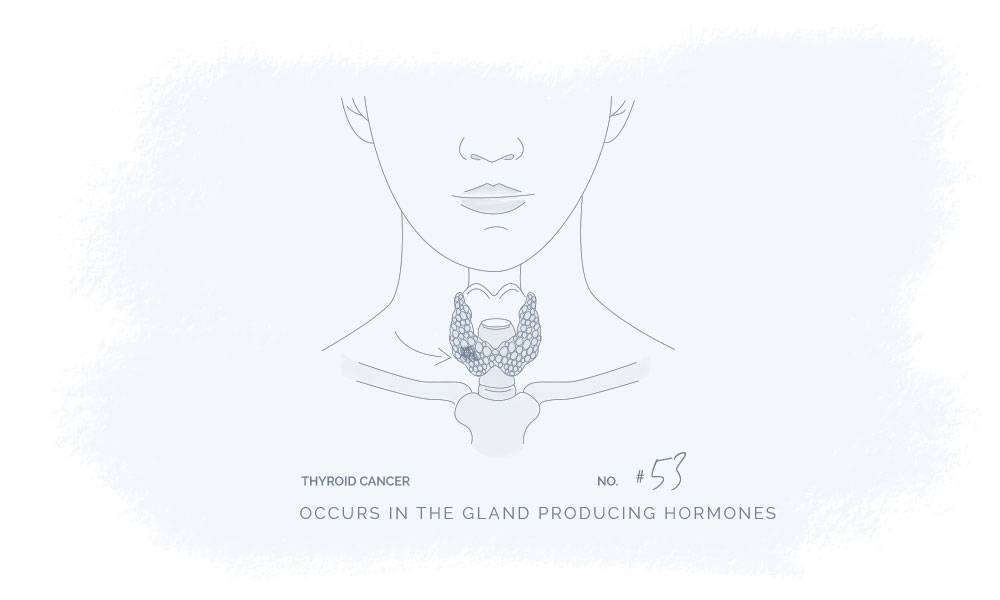Thyroid Cancer
Category
Cancer
REVIEWED BY
Our Biomedical Scientist
Reviewed based on
Literature Review
Last update
December 2020

What is Thyroid Cancer
Thyroid cancer occurs in the cells of the thyroid, a gland that produces hormones and regulates heart rate, blood pressure, body temperature as well as weight. Some types of thyroid cancer can be aggressive, however, often it can be treated.1
Symptoms
In the early stage of cancer, no symptoms or signs occur, however, as the disease progresses the following symptoms can occur:
- Pain in the neck and throat
- Swollen lymph nodes in your neck
- Difficulty swallowing
- Changes to your voice, e.g. increasing roughness
- A lump touchable through the skin
Cause
Like other types of cancer, thyroid cancer involves the growth of abnormal cells that contain mutations leading to uncontrollable cell division and growth. Similarly, it can spread and damage/destroy normal tissue. Today, several types of cancer exist.
Risk factors
Factors that can increase the risk of thyroid cancer are female sex (women can be more predisposed to thyroid cancer than men), exposure to radiation, and genetic syndromes.
The connection between Cannabinoids & Thyroid Cancer
Studies find that CBD and THC may have great therapeutic potential and may be used to help treat thyroid cancer. CBD and THC are well-known cannabinoids, however, they do not have the same psychoactive effects. THC is psychoactive while CBD does not possess psychoactive effects. According to WHO guidelines, the cannabidiol CBD is generally well tolerated with a good safety profile.
Preclinical data propose that cannabinoids CBD, CBDA, CBC , CBG, THCA and THC may be therapeutic in thyroid cancer as the cannabinoid receptors CB1 and CB2 are upregulated in people who suffer from thyroid cancer.
Furthermore, it is proposed that cannabis extracts can aid in the treatment of thyroid cancer.2
The literature discussion is an overview of the published results from scientific studies investigating if and how cannabinoids can be beneficial in the treatment of Psoriasis. The overview will be updated regularly to ensure the newest and most accurate information.
Endocannabinoids and cannabinoid receptors may help suppress cancer cell growth
A metabolically stable analog of anandamide was shown to suppress cancer growth in cell lines derived from thyroid carcinomas. This was through the stimulation of apoptosis . High levels of CB1 expression was responsible for this growth suppression.3
Anandamide analog together with CB1 may help induce apoptosis
Another study showed that basic fibroblast growth factor-stimulated endothelial cell proliferation was suppressed by the metabolically stable anandamide analog, 2-methyl-2′-F-anandamide (Met-F-AEA), in a dose-dependent manner. Furthermore, Met-F-AEA was shown to help induce apoptosis, both effects dependent on cannabinoid CB1 receptor stimulation.4
Met-F-AEA addition led to blocking of endocannabinoid reuptake, increasing endocannabinoid levels in athymic mice with rat thyroid tumor xenografts. Furthermore, it was suggested that Met-F-AEA may help in suppressing tumor growth via CB1 (Bifulco et al., 2001, 2004). The same Met-F-AEA was also shown to help suppress thyroid cancer metastasis in a CB1-dependent way.5
Stimulation of CB2 receptor together with chemotherapeutic drug may increase cancer cell death
Apoptosis and sensitivity to the chemotherapeutic drug paclitaxel were increased by boosting CB2 expression in the ARO cell line of the most aggressive type of thyroid cancer, anaplastic thyroid carcinoma. In nude mice overexpressing CB2 in thyroid cancer xenografts, considerable tumor regression was triggered by stimulation with CB2. This proposes that CB2 may serve as a feasible therapeutic target for the treatment of anaplastic thyroid carcinoma.6
In another study, it was shown that CB1 and CB2 expression was significantly increased in malignant thyroid lesions compared to benign thyroid lesions. Furthermore, increased expression of CB2 was shown to be connected to lymph node metastases. This proposes that cannabinoid receptors may play a role in malignant thyroid transformation and particularly CB2 receptors may be used as a good biomarker and potential therapeutic target for the treatment of thyroid cancer.7
Cannabinoids and extracts may suppress cancer cell growth
Further, it was shown that in a rat thyroid cancer cell line, cancer cell growth was suppressed by several plant cannabinoids and cannabis extracts.8
Clinical trials are research studies that examine new treatments and evaluate their effects on human health outcomes.
Today, we are not able to provide any clinical trials about cannabinoids and tourette syndrome.
- https://www.mayoclinic.org/diseases-conditions/thyroid-cancer/symptoms-causes/syc-20354161
- https://ghmedical.com/endocannabinoid-system/diseases/thyroid-cancer
- Cozzolino, R., Et Al., (2010). “A metabolically stable analogue of anandamide, Met-F-AEA, inhibits human thyroid carcinoma cell lines by activation of apoptosis”. https://pubmed.ncbi.nlm.nih.gov/19189054/
- Pisanti, S., Et Al., (2007). “Antiangiogenic activity of the endocannabinoid anandamide: correlation to its tumor-suppressor efficacy”. https://pubmed.ncbi.nlm.nih.gov/17192847/
- Portella, G., Et Al. (2003). “Inhibitory effects of cannabinoid CB1 receptor stimulation on tumor growth and metastatic spreading: actions on signals involved in angiogenesis and metastasis”. https://pubmed.ncbi.nlm.nih.gov/12958205/
- Shi, Y., Et Al., (2008). “Cannabinoid 2 receptor induction by IL-12 and its potential as a therapeutic target for the treatment of anaplastic thyroid carcinoma”. https://pubmed.ncbi.nlm.nih.gov/18197164/
- Lakiotaki, E.., et Al., (2015). “Clinical Significance of Cannabinoid Receptors CB1 and CB2 Expression in Human Malignant and Benign Thyroid Lesions”. https://www.ncbi.nlm.nih.gov/pmc/articles/PMC4619873/
- Ligresti, A., Et Al., (2006). “Antitumor activity of plant cannabinoids with emphasis on the effect of cannabidiol on human breast carcinoma”.
CANNABINOIDS & RECEPTORS
Below you find the plant cannabinoids, cannabinoid receptors, and endocannabinoids that are associated with the potential therapy.
If you have any further information relevant to the connection between thyroid cancer and cannabinoids or find any of the information inaccurate, outdated or incomplete please contact us here.

